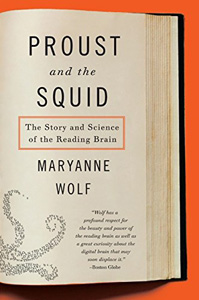 Maryanne Wolf, Proust and the Squid; The Story and Science of Reading and the Brain (New York: HarperCollins, 2007), 336pp.
Maryanne Wolf, Proust and the Squid; The Story and Science of Reading and the Brain (New York: HarperCollins, 2007), 336pp.
A review by Brad Keister
This book provides an overview of the science of reading, and argues for the deep value that a society of readers enjoys. Maryanne Wolf, the John DiBiaggio Professor of Citizenship and Public Service at Tufts University, was the director of the Tufts Center for Reading and Language Research. She currently directs the Center for Dyslexia, Diverse Learners, and Social Justice at UCLA, and is working with the Dyslexia Center at the UCSF School of Medicine and with Curious Learning: A Global Literacy Project, which she co-founded.
"There has never been a time when the complex beauty of the reading process stood more revealed," says Wolf, "when the magnitude of its contributions was more clearly understood by science, or when these contributions seemed more in danger of being replaced by new forms of communication.”
Unlike other human activities, people are not “born to read.” In fact,written languages took several millennia to develop, and even now, each child must learn anew to gain the skills to read.
Reading involves inputs from several centers of the brain, both left and right side, as they integrate the processing of visual images (of the letters themselves as well as what a word may represent), as well as the actual sounds of the spoken language. In the language of neuroscience, neurons that fire together, wire together, in such a way that recognition of and understanding of a written text becomes almost automatic. Children thus learn to synthesize visual, phonological and semantic aspects of the written word at lightning speed. As we get older, all of our experiences with words are folded in as well. For most adults, this processing of words on a printed page takes place in milliseconds.
In a side comment that illustrates both the scale of information involved in learning to read, as well as a relevant social issue, Wolf states that “in some environments the average young middle-class child hears 32 million more spoken words than the young underprivileged child by age five.”
Because reading is not a guaranteed human function, there are also dangers. First, Wolf notes that dyslexia has been seriously misunderstood until recently, precisely because its origins cannot be localized to one gene or one part of the brain. But contemporary advances have made it easier to find solutions and provide hope for those who have dyslexia, which continues to carry a strong negative social stigma. Second, there is the danger that electronic communication and social media may serve to render written language superficial. These topics are developed further in Wolf’s newest book, Reader, Come Home; The Reading Brain in a Digital World (2018), and in many interviews available online.
Wolf notes that in ancient Greece, Socrates expressed deep concerns about the development and use of written language: that written words were inflexible; that the existence of written documents would lead to loss of memory (why memorize?); and that society would lose control over its language. Notwithstanding these objections, written language, with the aid of the printing press for its dissemination, has flourished since the time of Socrates. Indeed, Socrates might worry more in our present time that a precious commodity may be lost via its trivialization.


